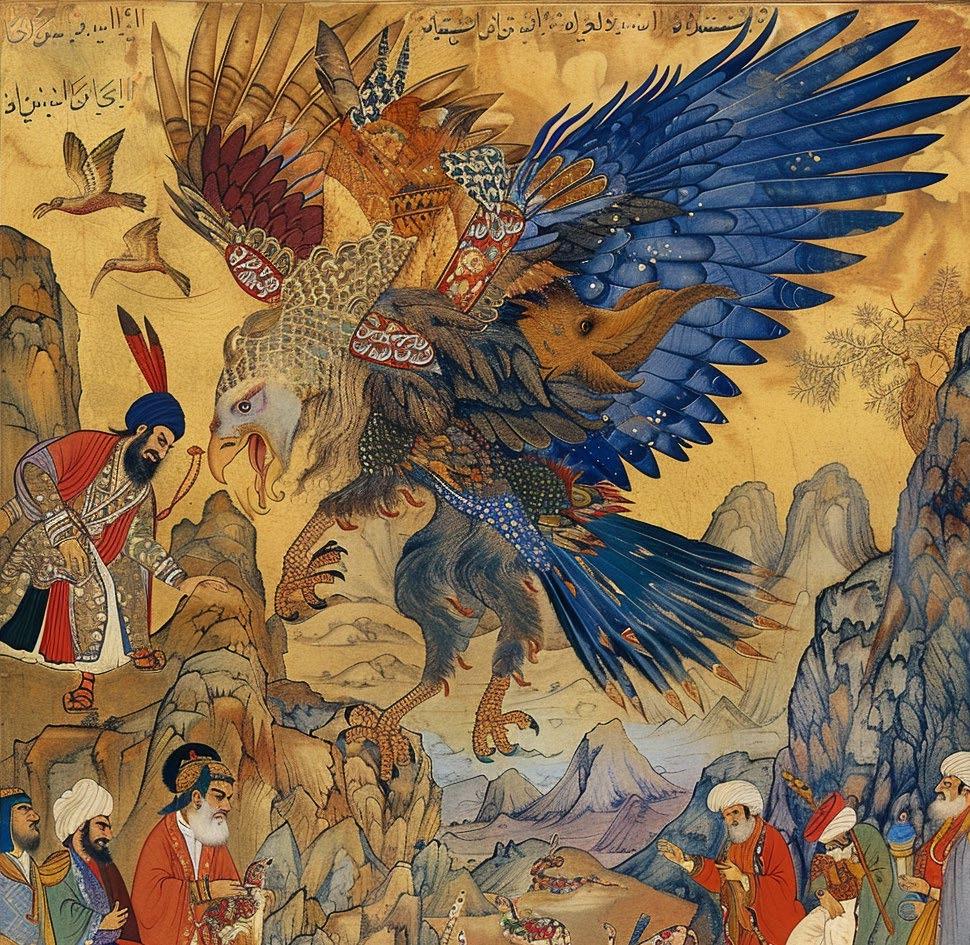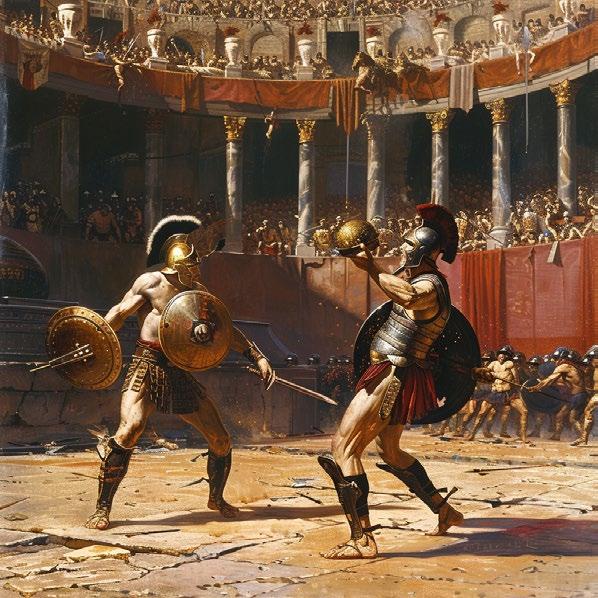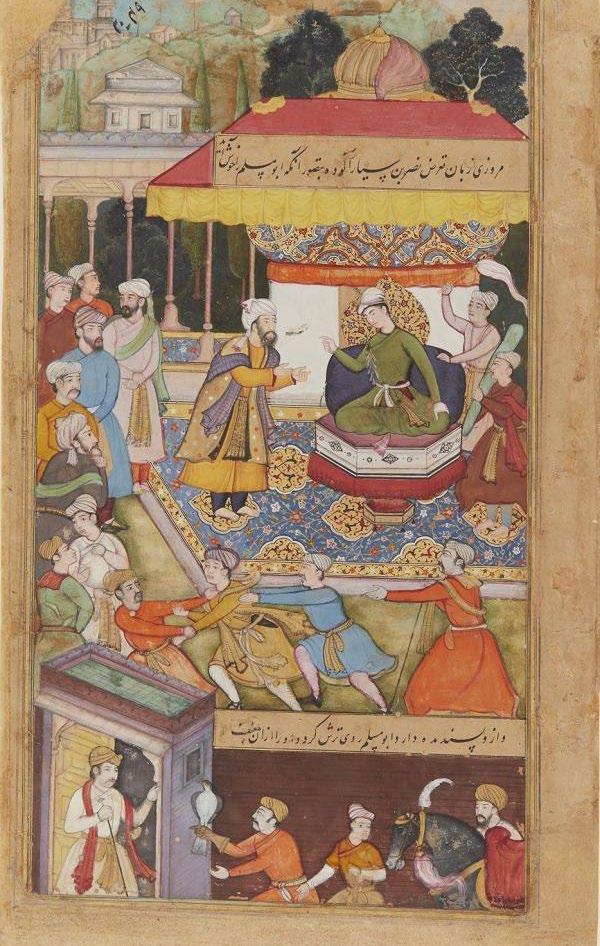Issue
16
Why Rolls-Royce Reigns Supreme in the World of Luxury Cars
By Shirzad MehrrafieeMohammad
RezaShajarian: A Masterpiece of Persian Weaving
Google Marketing Live 2024: Key Highlights and Innovations
By Dr. Iman Razavi

16
Why Rolls-Royce Reigns Supreme in the World of Luxury Cars
By Shirzad MehrrafieeMohammad
RezaShajarian: A Masterpiece of Persian Weaving
Google Marketing Live 2024: Key Highlights and Innovations
By Dr. Iman Razavi


Founder and Editor: Dr. Iman Razavi
Design Team: Mahsa Jafari
AI Pictures: Mahsa Jafari
Video Production: Amir Saraeimoghadam
106
Caligula: The Infamous Roman Emperor
110
Abu Muslim Khorasani: The Architect of the Abbasid Revolution
114
The Legacy of the Samurai: Warriors of Honor and Tradition
118
Gaz: The Sweet Delight of Isfahan
122
Identity Experience (Persian Prestige Media)
6303 Owensmouth Ave. Woodland Hills, CA 91367
Tel: (424) 285-9013
info@i-e.design www.persianprestigemagazine.com
Ghormeh Sabzi Recipe BUSINESS
146
The Importance of Visibility in Boosting Brand Awareness | ADVVA By Shirzad Rafiee
150
The Magic of Creation: How Walt Disney Brought Disneyland to Life
158
Anoush Sadegh: Pioneering AI and Transforming the Future
HEALTH & BEAUTY
162
Dental Implants: Transforming Smiles and Lives By Dr. Al Manesh
168
128
Emily in Paris: The Architect of the A Chic and Controversial Look at Life in the City of Lights
134
Mohammad Ali Fardin: The King of Iranian Cinema BUSINESS
138
Google Marketing Live 2024: Key Highlights and Innovations By Dr. Iman Razavi
The Vital Role of Body Butter Cream in Summer Skincare ZIIVVA FOOD
The Holistic Benefits of Chiropractic Care: Achieving a Healthy Lifestyle Through Spinal Health By Dr. Elham Nemat
172
ITUBAL Operation: Helping Women Become Moms Again By Dr. Aram Bonni 180
The Benefits of Home Health Services for Elderly People 186
Good dental health influences everything from nutrition to self-esteem By Dr. Ghazaleh Nouri
194

Editor's Letter
Welcome to this edition of Persian Prestige, where we explore the diverse tapestry of modern living. Our magazine, though rooted in a name that suggests a rich cultural heritage, spans a wide array of topics that touch every aspect of contemporary life. From health and beauty to food, fashion, history, cars, travel, culture, and business, we aim to offer something for everyone.
By Dr. Iman Razavi
In this issue, we dive deep into the world of health and beauty, presenting you with the latest trends and timeless tips to enhance your well-being. Discover articles such as "The Science of Skincare: What Really Works?" and "Holistic Approaches to Modern Wellness," where we uncover secrets to looking and feeling your best.
Food is a universal language that brings people together. In our culinary section, we explore a world of flavors, from exotic spices to comforting home-cooked meals. Check out "The Rise of Plant-Based Eating: A Guide" and "Street Food Wonders from Around the Globe" for inspiration on your next culinary adventure.
Fashion is ever-evolving, and our goal is to keep you at the forefront of the latest trends. In this edition, explore

pieces like "Sustainable Fashion: A New Era of Style" and "Timeless Wardrobe Staples Every Closet Needs," offering insights on how to blend sustainability with fashion-forward choices.
Understanding our history and culture enriches our present. This section features thoughtprovoking articles such as "Revisiting Iconic Moments in History" and "Cultural Traditions That Shape Modern Society," providing a deep dive into the events and customs that influence our lives today.
The automotive industry is undergoing rapid transformation. Our coverage includes "Electric Vehicles: The Road Ahead" and "Luxury Cars Redefined: Innovation Meets Elegance," exploring how technology and design are shaping the future of transportation.
Travel opens doors to new experiences and perspectives. In this issue, find inspiration in "Top Destinations for 2024" and "Travel Tips for the Modern Explorer," guiding you to plan your next unforgettable journey.
In our business section, we highlight stories of innovation and entrepreneurship that are driving change. Read about "Tech Startups to Watch in 2024" and "The Impact of Remote Work on Global Business," providing insights into the trends and technologies shaping the future of work.
At Persian Prestige, we celebrate the diversity
of human experience. Our cultural reflections section features articles such as "The Power of Music in Cultural Expression" and "Art as a Mirror of Society," showcasing the myriad ways culture influences and enriches our lives.
We value your feedback and invite you to share your thoughts on the topics that resonate with you. Your insights help us create content that is both engaging and relevant. Join the conversation and let us know what you think.
Send us your feedback and be part of the Persian Prestige community. Together, let's continue to explore, celebrate, and inspire.
JUNE 2024
persianprestigemagazine.com




THE FAUBOURG: A HOUSE OF OBJECTS


A cavalryman, a roof garden, majestic staircases, an iconic mosaic pattern, unique ironwork, Greek-style lamps, artworks, and, of course, objects that are either unbridled, unleashed or saddle-stitched! As if a tiny part of the Faubourg had pollinated 706 Madison Avenue. After all, the spirit is free to roam. But it comes from the Faubourg in Paris.












METIERS D’ART SHOW MANCHESTER 2023/24
ALIVE WITH A VIBRANT POP SPIRIT BORN IN MANCHESTER AND KEPT ALIVE ACROSS THE DECADES, THE CHANEL 2023/24 MÉTIERS D’ART SHOW EMBRACES THE CREATIVE DIALOGUE BETWEEN GREAT BRITAIN AND THE HOUSE, SO DEAR TO GABRIELLE CHANEL AND TODAY TO ARTISTIC DIRECTOR OF THE FASHION COLLECTIONS, VIRGINIE VIARD. A TESTIMONY TO THE ARTISANAL PRECISION OF THE MÉTIERS D’ART, THE COLLECTION SHIMMERS AND SHINES WITH PLAYFUL NODS TO BRITISH MUSIC CULTURE AND CHANEL’S ART OF TAILORING. CONTRASTING AUTUMNAL AND VIVID COLOURS, ENCRUSTED TEXTURES, PURE SILHOUETTES AND CAREFREE ATTITUDES INVOKE A SOFT YET AUDACIOUS FEMININITY. www.chanel.com












2023/24 Métiers d’art Collection





2023/24 Métiers d’art Collection






2023/24 Métiers d’art Collection





2023/24 Métiers d’art Collection



































Summer 24 Highlights
Yves Saint Laurent


















Summer 24 Highlights
Yves Saint Laurent

Seattle, known as the Emerald City, is a vibrant metropolis nestled between the waters of Puget Sound and the majestic peaks of the Cascade Mountains. Famous for its lush greenery, innovative tech industry, and rich cultural scene, Seattle offers a diverse array of attractions that cater to every type of traveler. From iconic landmarks and bustling markets to serene parks and eclectic neighborhoods, let’s explore the must-see tourist attractions that make Seattle a captivating destination.
Seattle’s Iconic Landmark
No visit to Seattle is complete without a trip to the Space Needle. Built for the 1962 World’s Fair, this futuristic structure stands at 605 feet and offers breathtaking 360-degree views of the city, Elliott Bay, and the surrounding mountains. The recently renovated observation deck features floor-to-ceiling glass walls and a rotating glass floor, providing an exhilarating experience for visitors. Whether you’re enjoying a meal at the SkyCity Restaurant or simply

soaking in the panoramic vistas, the Space Needle is a quintessential Seattle experience.
A Food Lover’s Paradise
Pike Place Market, one of the oldest continuously operating farmers markets in the United States, is a bustling hub of activity and a food lover’s paradise. Wander through the market’s vibrant stalls filled with fresh produce, artisanal foods, and unique crafts. Don’t miss the famous fishmongers who entertain crowds by throwing fish, or a visit to the original Starbucks store, a nod to Seattle’s coffee culture. The market also offers stunning views of the waterfront, making it a perfect spot for leisurely exploration and sampling local delicacies.
Located near the Space Needle, the Chihuly Garden and Glass is a mesmerizing exhibition showcasing the works of renowned glass artist Dale Chihuly. The museum features an array of intricate glass sculptures, from delicate

sea forms to towering installations that captivate the imagination. The highlight is the Glasshouse, a stunning structure with a 100foot long sculpture suspended from the ceiling. The outdoor garden, filled with vibrant glass pieces that blend harmoniously with the natural landscape, is equally enchanting.
The Museum of Pop Culture (MoPOP), housed in a striking building designed by Frank Gehry, is a must-visit for music and pop culture enthusiasts. The museum celebrates contemporary popular culture with exhibits dedicated to music, science fiction, fantasy, and gaming. Highlights include the interactive Sound Lab, the Guitar Gallery, and the impressive collection of artifacts from legendary musicians such as Jimi Hendrix and Nirvana. MoPOP offers a dynamic and immersive experience that reflects Seattle’s rich musical heritage and creative spirit.
Seattle’s waterfront is a lively area filled with attractions, dining, and entertainment options. Stroll along the scenic Alaskan Way and enjoy views of Elliott Bay, visit the Seattle Aquarium to learn about marine life, or take a ride on the Seattle Great Wheel for stunning vistas of the city and beyond. The waterfront is also the departure point for ferries to nearby destinations like Bainbridge Island and the San Juan Islands, offering picturesque getaways just a short ride away.
For those seeking a natural retreat within the city, Discovery Park is Seattle’s largest green space, covering 534 acres. This urban oasis offers a network of trails that wind through forests,

meadows, and beaches, providing diverse landscapes to explore. The park’s highlight is the West Point Lighthouse, which offers panoramic views of Puget Sound and the Olympic Mountains. Discovery Park is a perfect destination for hiking, birdwatching, and simply enjoying the tranquility of nature.
The Fremont neighborhood, known for its quirky charm and artistic vibe, is a delightful area to explore. Known as the “Center of the Universe,” Fremont is home to an array of eclectic sculptures, including the famous Fremont Troll under the Aurora Bridge and the whimsical statue of Lenin. The neighborhood also hosts a variety of unique shops, cafes, and the bustling Fremont Sunday Market. Fremont’s bohemian atmosphere and creative energy make it a fun and vibrant destination.
Seattle, with its blend of natural beauty, cultural richness, and innovative spirit, offers an array of attractions that cater to all interests. Whether you’re gazing at the cityscape from the Space Needle, savoring fresh seafood at Pike Place Market, or immersing yourself in the artistic wonders of Chihuly Garden and Glass, Seattle promises an unforgettable experience. Plan your visit to this dynamic city and discover why Seattle is truly the Emerald City.


Kyoto, once the imperial capital of Japan for over a thousand years, is a city that seamlessly blends ancient traditions with modern charm. Known for its well-preserved temples, stunning gardens, and vibrant cultural festivals, Kyoto offers a rich tapestry of experiences for travelers. This historical city, often referred to as the cultural heart of Japan, is a treasure trove of attractions that captivate the senses and the soul. Let’s explore the must-see tourist attractions that make Kyoto an enchanting destination.
Kinkaku-ji:
The Golden Pavilion
Kinkaku-ji, also known as the Golden Pavilion, is one of Kyoto’s most iconic landmarks. This Zen Buddhist temple, covered in gold leaf, sits majestically beside a tranquil pond, creating a stunning reflection in the water. Originally built in 1397, the pavilion has been rebuilt and restored over the centuries, maintaining its exquisite beauty. Visitors can stroll through the surrounding gardens, which offer picturesque views and a peaceful atmosphere, making it a perfect spot for contemplation and photography.





Fushimi Inari Taisha:
The Path of a Thousand Torii
Fushimi Inari Taisha is a Shinto shrine famous for its thousands of vermilion torii gates that create a mesmerizing path through the sacred Mount Inari. This shrine, dedicated to Inari, the god of rice and agriculture, dates back to the 8th century. The hike up the mountain, passing through the torii gates and smaller shrines, offers a spiritual journey with breathtaking views of Kyoto. The Senbon Torii (thousands of torii gates) is a highlight, creating a vibrant tunnel that has become one of Kyoto’s most photographed attractions.
The Arashiyama Bamboo Grove, located in the Arashiyama district, is a serene and otherworldly destination. Walking through the towering bamboo stalks, with sunlight filtering through
the dense canopy, provides a sense of tranquility and awe. The sound of rustling bamboo leaves adds to the magical ambiance. Nearby, visitors can explore the Tenryu-ji Temple, a UNESCO World Heritage site, and the charming Togetsukyo Bridge, which spans the Katsura River.
Kiyomizu-dera, meaning “Pure Water Temple,” is one of Kyoto’s most celebrated temples. Founded in 778, the temple is renowned for its wooden stage that juts out from the main hall, offering panoramic views of Kyoto and the surrounding cherry and maple trees. The temple’s name derives from the Otowa Waterfall, whose waters are divided into three streams, each believed to confer a different benefit: longevity, academic success, and a fortunate love life. Visitors can drink from these streams using cups attached to long poles.



The Gion District is Kyoto’s famous geisha district, known for its traditional wooden machiya houses, teahouses, and narrow alleyways. Wandering through Gion, visitors may catch a glimpse of geiko (geisha) and maiko (apprentice geisha) dressed in elaborate kimonos as they hurry to their appointments. Gion is also home to the Yasaka Shrine, a vibrant hub of cultural activities. For an authentic experience, visitors can enjoy a traditional tea ceremony, dine in a kaiseki restaurant, or attend a performance at the Gion Corner.
Nijo Castle, a UNESCO World Heritage site, provides a fascinating glimpse into Japan’s feudal era. Built in 1603 as the residence of Tokugawa Ieyasu, the first shogun of the Edo period, the castle complex includes the Ninomaru Palace, known for its beautifully painted sliding doors (fusuma) and “nightingale floors” that chirp when walked upon to warn of intruders. The surrounding gardens, especially the Ninomaru Garden with its intricate design, offer a peaceful retreat within the

castle grounds.
The Philosopher’s Path, or Tetsugaku no Michi, is a scenic pedestrian walkway that follows a canal lined with cherry trees in the northern part of Kyoto’s Higashiyama district. Named after the famous Japanese philosopher Nishida Kitaro, who was said to meditate while walking this route, the path is particularly stunning during the cherry blossom season in spring and the vibrant foliage of autumn. Along the way, visitors can explore several smaller temples and shrines, adding to the contemplative and serene experience.
Kyoto, with its timeless beauty and profound cultural heritage, offers a captivating journey through Japan’s history and traditions. From the golden splendor of Kinkaku-ji and the spiritual path of Fushimi Inari Taisha to the serene bamboo groves of Arashiyama and the historic charm of Gion, Kyoto promises an unforgettable experience. Plan your visit to this enchanting city and immerse yourself in the magic of Kyoto’s ancient wonders and enduring spirit.


Qeshm Island, located in the azure waters of the Persian Gulf, is Iran’s largest island and a treasure trove of natural and cultural attractions. This enchanting island offers a perfect blend of breathtaking landscapes, rich history, and unique cultural experiences, making it an ideal destination for travelers seeking an off-the-beaten-path adventure. Let’s embark on a journey to discover the mesmerizing tourist attractions of Qeshm Island.
One of Qeshm’s most iconic natural wonders is the Valley of Stars, locally known as “Setarehha-ye Qeshm.” This otherworldly landscape, shaped by centuries of erosion, features towering rock formations and deep canyons. As the legend goes, a star fell from the sky, creating this surreal terrain. Whether you believe the folklore or not, wandering through this valley feels like stepping onto another planet. The play of light and shadow during sunrise and sunset adds an ethereal beauty to the experience.

The Hara Forests, a protected biosphere reserve, are a must-visit for nature enthusiasts. These mangrove forests, covering over 8,000 hectares, are a sanctuary for diverse wildlife, including migratory birds, fish, and crustaceans. Exploring the Hara Forests by boat offers a tranquil escape into nature, where you can observe the unique ecosystem and its inhabitants. Birdwatchers will be delighted by the sight of flamingos, herons, and pelicans.
Chahkooh Canyon is another natural wonder that showcases the island’s dramatic geological features. This narrow canyon, with its towering walls and intricate rock formations, is a paradise for photographers and adventurers alike. The interplay of light within the canyon creates stunning visual effects, making it a favorite spot for capturing breathtaking photos. Hiking through Chahkooh Canyon is an exhilarating experience, revealing the raw beauty of Qeshm’s rugged landscape.

The
Namakdan Cave, also known as the Salt Cave, is the longest salt cave in the world, stretching over 6 kilometers. Inside this cave, visitors are greeted by dazzling salt formations, stalactites, and stalagmites that glisten like diamonds. The air inside the cave is rich in salt particles, believed to have therapeutic benefits for respiratory conditions. Exploring Namakdan Cave feels like entering a natural cathedral, where the artistry of nature is on full display.
For history buffs, the Portuguese Castle in Qeshm is a significant landmark. Built in the early 16th century during the Portuguese occupation of the island, this fortress stands as a testament to the island’s strategic importance in maritime trade routes. Although partially ruined, the castle offers panoramic views of the surrounding area and provides insight into Qeshm’s historical heritage. Walking through its ancient corridors evokes a sense of stepping back in time.
Beyond its natural and historical attractions, Qeshm Island is a cultural melting pot. The island’s inhabitants, known for their warm hospitality, have a rich cultural heritage influenced by Persian, Arab, and African traditions. Visitors can explore traditional villages, where they can witness local crafts, music, and dance. The island’s cuisine is another highlight, featuring fresh seafood and unique dishes like “morabyan” (a spicy shrimp dish) and “kabab-e mahi” (grilled fish).
Qeshm Island is a destination that promises adventure, serenity, and cultural enrichment. From its stunning natural landscapes and historical sites to its vibrant local culture, the island offers a diverse range of experiences for every traveler. Whether you are exploring the mystical Valley of Stars, navigating the lush Hara Forests, or delving into the depths of Namakdan Cave, Qeshm Island is sure to leave you with unforgettable memories. Plan your visit to this hidden gem in the Persian Gulf and uncover the wonders that await on Qeshm Island.










The 2024 Toyota Sienna Hybrid stands out as a top choice for families seeking a versatile, efficient, and feature-packed minivan. Combining Toyota’s renowned reliability with modern hybrid technology, the Sienna Hybrid offers an impressive blend of performance, fuel economy, and advanced safety features. Here’s why the 2024 Toyota Sienna Hybrid is the ultimate family vehicle:


One of the most compelling reasons to choose the 2024 Sienna Hybrid is its exceptional fuel efficiency. Powered by a hybrid powertrain, the Sienna achieves an estimated 36 miles per gallon (MPG) combined. This significant improvement over traditional gasoline-powered minivans means fewer stops at the pump and more savings on fuel costs, making long family road trips more economical.
The 2024 Sienna Hybrid offers a spacious interior designed with families in mind. With seating for up to eight passengers, the Sienna ensures everyone has ample room to stretch out and relax. The second-row seats feature available captain’s chairs with an optional ottoman, providing first-class comfort for passengers. The third-row seats are easily accessible and can be folded down to expand cargo space, accommodating all the gear needed for family adventures.






Safety is a top priority for family vehicles, and the 2024 Sienna Hybrid excels in this area with Toyota Safety Sense 2.0. This suite of advanced safety features includes:


Pre-Collision System with Pedestrian Detection:
Helps detect and mitigate potential collisions with vehicles or pedestrians.
Lane Departure Alert with Steering Assist:
Alerts the driver if the vehicle begins to drift out of its lane and provides gentle steering assistance to help maintain lane position.
Dynamic Radar Cruise Control:
Maintains a preset distance from the vehicle ahead, adjusting speed as necessary to ensure a safe following distance.
Lane Tracing Assist:
Keeps the vehicle centered in its lane using road markings and preceding vehicles as a guide.
Road Sign Assist:
Detects road signs and displays them on the vehicle’s display panel for driver awareness.



The 2024 Sienna Hybrid is equipped with a host of technology features that enhance convenience and entertainment for the whole family. The available 10-inch color Head-Up Display projects important information onto the windshield, allowing drivers to keep their eyes on the road. The rear-seat entertainment system includes a large screen and HDMI inputs, perfect for keeping kids entertained on long journeys. Apple CarPlay, Android Auto, and Amazon Alexa compatibility ensure seamless integration with smartphones, enabling easy access to navigation, music, and hands-free communication.
Flexibility is key when it comes to family vehicles, and the Sienna Hybrid delivers with its versatile cargo space. The power-folding third-row seats and sliding second-row seats allow for various configurations to accommodate passengers and cargo. Whether you’re loading up groceries, sports equipment, or luggage for a family vacation, the Sienna’s spacious interior can handle it all. Additionally, the hands-free power liftgate makes it easy to access the rear cargo area, even when your hands are full.
The 2024 Toyota Sienna Hybrid boasts a sleek, modern design that defies the traditional minivan stereotype. Its bold front grille, sculpted body lines, and available 20-inch alloy wheels give it a sophisticated and stylish appearance. Inside, the Sienna offers premium materials and finishes, creating a comfortable and inviting environment for both drivers and passengers. Practical features like the available all-wheel drive (AWD) system provide added confidence and stability in various driving conditions, making the Sienna a reliable choice for family adventures.
The 2024 Toyota Sienna Hybrid is a standout family vehicle that combines exceptional fuel efficiency, advanced safety features, and versatile interior space. Its blend of modern technology, comfort, and stylish design makes it an ideal choice for families seeking a reliable and efficient minivan. Whether you’re running daily errands, embarking on a road trip, or simply navigating the demands of family life, the Sienna Hybrid offers everything you need to make the journey enjoyable and stress-free.


Nestled in the heart of Italy, the Ferrari Museum stands as a testament to the brand’s unparalleled legacy of luxury, performance, and innovation in the automotive world. Located in Maranello, the home of Ferrari, this museum offers an immersive experience for car enthusiasts, history buffs, and anyone with a passion for high-performance vehicles. Here’s an in-depth look at what makes the Ferrari Museum a must-visit destination.


www.ferrari.com

The Ferrari Museum, also known as Museo Ferrari, takes visitors on a captivating journey through the storied history of one of the most iconic car manufacturers in the world. Founded by Enzo Ferrari in 1947, the brand quickly became synonymous with speed, luxury, and cutting-edge technology.
1. The Enzo Ferrari Hall:
Named after the founder, this hall is dedicated to the life and achievements of Enzo Ferrari. It features rare photographs, personal artifacts, and early models that highlight the origins and evolution of the brand. Visitors can gain insight into Enzo Ferrari’s vision and the early challenges he faced in establishing Ferrari as a premier automotive brand.
2. The Trophy Room:
The Trophy Room showcases Ferrari’s illustrious racing heritage. Filled with trophies, awards, and memorabilia from decades of Formula 1 victories, this exhibit pays homage to the brand’s dominance on the racing circuit. Visitors can see the actual trophies won by legendary drivers like Michael Schumacher and Niki Lauda, and learn about the technical innovations that propelled Ferrari to the top of the podium.








One of the main attractions of the Ferrari Museum is its extensive collection of iconic Ferrari models. From classic road cars to legendary race cars, the museum’s collection showcases the brand’s commitment to excellence in design and engineering.
1. Classic Road Cars:
The museum features a stunning array of classic Ferrari road cars, each representing a milestone in automotive design. Highlights include the Ferrari
250 GTO, renowned for its beauty and rarity, and the Ferrari F40, a supercar that set new standards for performance in the 1980s. These models not only highlight Ferrari’s design evolution but also its relentless pursuit of perfection.
2. Formula 1 Cars:
For racing enthusiasts, the museum’s collection of Formula 1 cars is a highlight. These cars, driven by some of the greatest names in motorsport history, showcase the technological advancements and engineering prowess that have made Ferrari a force to be reckoned with in Formula 1. From early models to modern-day machines, this exhibit offers a comprehensive look at Ferrari’s racing legacy.






The Ferrari Museum is not just about viewing cars; it’s about experiencing the passion and innovation that define the brand. Several interactive exhibits and experiences allow visitors to engage with Ferrari’s rich heritage in unique ways.
1. Virtual Reality and Simulators:
The museum offers state-of-the-art virtual reality experiences and driving simulators, allowing visitors to feel the thrill of driving a Ferrari. These interactive exhibits provide an immersive experience, putting visitors in the driver’s seat of a high-performance Ferrari on some of the world’s most famous racetracks.
2. Engine Gallery:
The Engine Gallery provides a fascinating look at the heart of every Ferrari—the engine. This exhibit showcases a range of Ferrari engines, from early V12s to modern hybrid powertrains, illustrating the brand’s continuous innovation in engine technology. Interactive displays explain the engineering and mechanics behind these powerful machines.



No visit to the Ferrari Museum is complete without a stop at the Ferrari Store and Café. The store offers a wide range of Ferrari-branded merchandise, from apparel and accessories to scale models and memorabilia. It’s the perfect place to pick up a souvenir to remember your visit.
The café provides a relaxing spot to enjoy a coffee or a light meal while soaking in the automotive ambiance. Overlooking the museum grounds, it offers a unique dining experience for visitors.


The Ferrari Museum in Maranello is more than just a museum; it’s a celebration of the passion, innovation, and excellence that define the Ferrari brand. With its rich history, iconic cars, interactive experiences, and unique exhibits, the museum offers something for everyone, from dedicated Ferrari fans to casual visitors. Whether you’re a lifelong enthusiast or discovering Ferrari for the first time, a visit to the Ferrari Museum is an unforgettable experience that captures the spirit of one of the world’s most prestigious automotive brands.




When it comes to luxury automobiles, few names evoke the same level of prestige, elegance, and craftsmanship as Rolls-Royce. With a legacy spanning over a century, Rolls-Royce has become synonymous with opulence and unparalleled quality. Here’s why Rolls-Royce is considered one of the best luxury car brands in the world.


Founded in 1906, Rolls-Royce has a long and illustrious history of creating some of the finest automobiles ever made. The brand's commitment to excellence is evident in every vehicle that rolls out of its factory. This heritage of craftsmanship and attention to detail is a key reason why RollsRoyce is held in such high regard.
At the heart of Rolls-Royce's appeal is its dedication to craftsmanship. Each Rolls-Royce vehicle is a masterpiece, meticulously crafted by skilled artisans. The attention to detail is astounding—from the hand-stitched leather interiors to the bespoke wood veneers, every element is crafted to perfection. This level of craftsmanship ensures that each car is unique and tailored to the owner's exact specifications.
Rolls-Royce offers an unparalleled level of customization. The brand's bespoke program allows customers to personalize every aspect of their vehicle, from the exterior color to the interior materials and finishes. This means that no two Rolls-Royce cars are exactly alike, allowing owners to create a truly one-of-a-kind vehicle that reflects their personal taste and style.
While Rolls-Royce cars are renowned for their luxury and elegance, they also offer exceptional performance. The brand's commitment to innovation and engineering excellence ensures that each vehicle delivers a smooth, powerful, and refined driving experience. Whether it's the effortless acceleration of the Ghost or the commanding presence of the Cullinan, RollsRoyce vehicles are designed to offer the ultimate in driving pleasure.
Rolls-Royce vehicles are known for their
timeless design. The brand's iconic models, such as the Phantom and the Wraith, combine classic elegance with modern sophistication. The distinctive grille, the Spirit of Ecstasy hood ornament, and the flowing lines of the bodywork all contribute to a design language that is instantly recognizable and enduringly stylish.



Owning a Rolls-Royce is more than just owning a car; it’s a statement of success and achievement. The brand's association with royalty, celebrities, and business magnates has cemented its status as the ultimate symbol of luxury and prestige. Driving a Rolls-Royce is a way to signal one's status and discerning taste.
Despite its heritage, Rolls-Royce is at the forefront of automotive technology. The brand seamlessly integrates cutting-edge technology into its vehicles, enhancing both performance and comfort. Features such as advanced driver assistance systems, state-of-the-art infotainment, and bespoke audio systems ensure that Rolls-Royce owners enjoy the latest in automotive innovation.
In recent years, Rolls-Royce has also made significant strides in sustainability. The brand is committed to reducing its environmental impact and is investing in the development of electric and
hybrid models. This commitment to sustainability ensures that Rolls-Royce will continue to lead the luxury automotive industry into the future.
Rolls-Royce offers an ownership experience that is second to none. From the moment a customer orders their vehicle, they are treated to a personalized and luxurious experience. The brand's global network of dealerships and service centers ensures that every aspect of ownership is effortless and enjoyable.
Rolls-Royce's reputation as one of the best luxury car brands in the world is well-deserved. With a rich heritage, unmatched craftsmanship, bespoke customization, superior performance, timeless design, and a commitment to innovation and sustainability, Rolls-Royce continues to set the standard for luxury automobiles. Owning a Rolls-Royce is more than just owning a car; it’s owning a piece of automotive history and a symbol of ultimate luxury.




Ferdosi, also known as Ferdowsi, stands as one of the most influential literary figures in Persian culture. Born in the 10th century, he is celebrated for his monumental work, the Shahnameh (The Book of Kings), which is often regarded as the national epic of Greater Iran. This article explores the life, legacy, and lasting impact of this extraordinary poet.
The Life of Ferdosi
Abul-Qasem Ferdosi Tusi was born in 940 CE in the village of Paj, near Tus in present-day Iran. Despite the scarcity of detailed records about his early life, it is known that Ferdosi hailed from a family of landowners, providing him with the means to pursue his passion for literature and poetry. His keen intellect and love for Persian heritage propelled him into a lifelong quest to preserve and celebrate Persian culture and history.


The Shahnameh, Ferdosi’s magnum opus, is an epic poem consisting of about 50,000 couplets.
Written over three decades, this literary masterpiece chronicles the history of the Persian Empire from mythical beginnings until the Islamic conquest of Persia in the 7th century. The Shahnameh is divided into three distinct sections: the mythical, the heroic, and the historical ages. Each section
is brimming with tales of legendary kings, brave heroes, and significant historical events.
Ferdosi’s dedication to the preservation of the Persian language is evident in his conscious effort to avoid Arabic words, which had increasingly infiltrated Persian literature. His work not only revived the Persian language but also instilled a sense of national pride among Iranians.

Ferdosi’s influence extends far beyond his lifetime. The Shahnameh remains a cornerstone of Persian literature and continues to be a source of inspiration for poets, scholars, and artists. It has been translated into numerous languages, allowing the global audience to appreciate its rich
narrative and cultural significance.
In Iran, Ferdosi is revered as a national hero. His mausoleum in Tus is a pilgrimage site for those who wish to pay homage to the man who played a pivotal role in preserving Persian identity. Annual celebrations and festivals are held in his honor, highlighting his enduring legacy.

The Shahnameh has had a profound impact on Persian culture, shaping the collective consciousness and cultural identity of Iranians. Its tales of heroism, justice, and morality continue to resonate with contemporary audiences. The stories of Rostam, Sohrab, and other legendary
figures have been adapted into various forms of art, including theater, cinema, and visual arts.
Moreover, Ferdosi’s work has influenced Persian language and literature significantly. His style of poetry set a benchmark for future generations, ensuring that the Persian literary tradition remained vibrant and influential.

Ferdosi’s contributions to Persian literature and culture are immeasurable. Through his epic Shahnameh, he not only safeguarded the Persian language but also immortalized the rich history and heritage of Iran. His legacy lives on, inspiring countless individuals and continuing to be a beacon of cultural pride for Persians around the world.
In an era where cultural identity can often be overshadowed by globalization, Ferdosi’s work serves as a reminder of the importance of preserving and celebrating one’s heritage. His timeless tales of valor, wisdom, and perseverance are as relevant today as they were a millennium ago.



The Heriz rug, renowned for its durability and intricate designs, stands as one of the most celebrated and sought-after types of Persian carpets. Originating from the town of Heriz in the East Azerbaijan Province of northwest Iran, these rugs embody a unique blend of cultural artistry and practical craftsmanship. This article delves into the rich history, distinctive characteristics, and enduring appeal of the Heriz rug, shedding light on why it continues to be a cherished piece in homes and collections around the world.


Heriz rugs have a long and storied history dating back to the 19th century. The town of Heriz, situated near the slopes of Mount Sabalan, has been a prominent center of rug weaving for centuries. The region’s weavers have perfected their craft over generations, producing rugs that not only serve as beautiful decorative pieces but also as durable floor coverings that can withstand heavy use.
The weaving techniques and designs of Heriz rugs are influenced by the rich cultural heritage of the region. The interplay of Persian, Caucasian, and Turkish motifs in their patterns reflects the diverse cultural interactions that have shaped the artistic traditions of northwest Iran.


Several features distinguish Heriz rugs from other Persian carpets, making them easily recognizable and highly prized:
1. Geometric Designs:
Heriz rugs are renowned for their bold geometric patterns. Unlike the curvilinear designs often found in other Persian rugs, Heriz rugs feature angular and rectilinear motifs. Central medallions, framed by a series of smaller geometric shapes and floral elements, are a hallmark of Heriz designs.
2. Robust Construction:
One of the standout qualities of Heriz rugs is their durability. They are known for their thick pile and sturdy construction, which make them ideal for high-traffic areas. This durability is largely attributed to the use of high-quality wool and a particular knotting technique that ensures the rug’s resilience over time.
3. Rich Color Palette:
Heriz rugs typically showcase a rich and vibrant color palette, with deep reds, blues, and earthy tones predominating. The dyes used are often derived from natural sources, which not only contribute to the rug’s aesthetic appeal but also ensure that the colors age gracefully.
4. Large Scale:
Heriz rugs are often larger in size compared to other Persian rugs, making them suitable for spacious rooms and grand settings. Their impressive scale and commanding presence add a touch of elegance and sophistication to any space.
The Weaving Process
The creation of a Heriz rug is a meticulous process that involves several stages, each requiring exceptional skill and attention to detail:
1. Wool Preparation:
High-quality wool is selected and spun into yarn. The yarn is then dyed using natural dyes, which provide the rug with its characteristic rich colors.
2. Design:
A design is meticulously planned, often drawing inspiration from traditional motifs and patterns. The design is transferred onto a graph, which serves as a guide for the weavers.
3. Weaving:
The weavers begin the intricate process of knotting the rug. Using a loom, they tie each knot by hand, following the design graph closely. This stage can take several months to complete, depending on the size and complexity of the rug.
4. Finishing:
Once the weaving is complete, the rug is cut from the loom and undergoes a series of finishing processes. This includes trimming the pile to a uniform height, washing the rug to enhance its luster, and stretching it to ensure its shape is perfect.
The Enduring Appeal
The timeless appeal of Heriz rugs lies in their ability to blend traditional craftsmanship with versatile design. Whether placed in a contemporary living room, a traditional dining area, or a grand

foyer, a Heriz rug adds a touch of warmth and elegance to any interior.
Collectors and interior designers alike appreciate Heriz rugs not only for their beauty but also for their investment value. A well-maintained Heriz rug can appreciate in value over time, making it a cherished heirloom passed down through generations.
Conclusion
The Heriz rug is more than just a floor covering; it is a work of art that embodies the rich cultural heritage and skilled craftsmanship of its makers. With its bold geometric designs, vibrant colors, and robust construction, the Heriz rug continues to be a symbol of enduring beauty and practical elegance. Whether you are an avid collector or simply looking to enhance your home’s decor, a Heriz rug is a timeless investment that will bring joy and sophistication for years to come.


MMohammad Reza Shajarian, often hailed as one of the greatest vocalists in Persian classical music, left an indelible mark on the world with his unparalleled artistry and deep connection to Iran’s musical heritage. Known for his powerful voice, masterful technique, and profound interpretations, Shajarian’s contributions have enriched Persian culture and captivated audiences around the globe. This article explores the life, achievements, and legacy of Mohammad Reza Shajarian.




Born on September 23, 1940, in Mashhad, Iran, Mohammad Reza Shajarian was introduced to traditional Persian music at a young age. His father, a music enthusiast, recognized his son’s talent and nurtured it by encouraging him to recite the Quran with the traditional melodies known as “Tajweed.” This early exposure to melodic recitation laid the foundation for Shajarian’s deep understanding of Persian musical modes, known as “Dastgah.”
Shajarian’s formal music education began under the tutelage of Ahmad Ebadi and later continued with the legendary masters Esmaeil Mehrtash and Abdollah Davami. These formative years were crucial in shaping his exceptional vocal abilities and comprehensive knowledge of Persian classical music.
Shajarian’s rise to fame began in the 1960s and 1970s, a period during which he collaborated with renowned musicians and composers, such as Faramarz Payvar and Mohammad Reza Lotfi. His performances were characterized by a remarkable range and a deep emotional resonance that connected with listeners on a profound level.
One of Shajarian’s significant contributions was his role in reviving and preserving traditional Persian music at a time when Western influences were becoming increasingly dominant in Iran. He dedicated himself to the study and performance of classical Persian poetry, setting the verses of poets like Hafez, Saadi, and Rumi to music. This commitment not only honored Iran’s rich literary heritage but also ensured that classical Persian music remained relevant and vibrant.
Shajarian’s artistry was marked by his ability to blend tradition with innovation. He was a master of the Radif, the collection of old melodies in
Persian classical music, and was renowned for his improvisational skills. His deep understanding of the subtleties of Persian poetry allowed him to deliver performances that were both technically brilliant and emotionally moving.
One of his most celebrated works is the album “Bidad,” produced in collaboration with the Shahnaz Ensemble. The album features some of his most iconic renditions of Persian classical pieces, showcasing his vocal range and the expressive depth of his interpretations. His ability to convey complex emotions through his singing made him a beloved figure among Persian music enthusiasts.
Beyond his musical achievements, Mohammad Reza Shajarian was also known for his political activism and advocacy for social justice. During the political upheavals in Iran, particularly around the 2009 presidential elections, Shajarian openly expressed his support for the people’s demands for greater freedom and justice. His song “Morghe Sahar” (The Dawn Bird), a symbol of hope and resilience, became an anthem for those seeking change.
In response to the government’s use of his music for propaganda, Shajarian famously demanded that his voice be silenced on state television, stating, “My voice is the voice of dust and mud, not the voice of bullets.” This courageous stance further cemented his status as a national icon and a voice of the people.
Mohammad Reza Shajarian’s legacy is profound and far-reaching. He received numerous accolades throughout his career, including the UNESCO Mozart Medal and the Golden Picasso Medal, recognizing his contributions to world music and culture. In 2010, he was named by NPR as one of the 50 great voices of the world.


Shajarian’s impact extends beyond his recordings and performances. He founded the Shahnaz Ensemble and the Ava Music Institute, fostering a new generation of musicians dedicated to preserving and innovating within the framework of Persian classical music. His son, Homayoun Shajarian, has also emerged as a prominent vocalist, continuing his father’s artistic legacy.
Mohammad Reza Shajarian’s life and work have left an indelible mark on the world of music and culture. His dedication to preserving and enriching Persian classical music, coupled with his unwavering commitment to social justice, made him a revered figure in Iran and beyond. His voice, filled with passion, wisdom, and beauty, continues to inspire and resonate with audiences, ensuring that his legacy will endure for generations to come.






Caligula, born Gaius Julius Caesar Augustus Germanicus in 12 AD, remains one of the most infamous figures in Roman history. His reign as emperor, from 37 AD to 41 AD, is often remembered for its extreme extravagance, cruelty, and eccentricity. Though his rule was brief, Caligula’s actions and behavior left a lasting impression on Roman history, marking his name with both intrigue and notoriety.

Caligula was born into the Julio-Claudian dynasty, the son of Germanicus, a beloved Roman general, and Agrippina the Elder, a member of the imperial family. As a child, he accompanied his father on military campaigns and was affectionately nicknamed “Caligula,” meaning “little boots,” by the soldiers due to the miniature military boots he wore.
Following the death of his father, Caligula’s family fell out of favor with Emperor Tiberius. Despite the political turbulence, Caligula managed to survive and was eventually adopted by Tiberius. Upon Tiberius’s death in 37 AD, Caligula was declared emperor, a move initially celebrated by the Roman populace who saw him as the son of the revered Germanicus.
Caligula’s early reign was marked by popular reforms and public works that endeared him to the people. He granted bonuses to the Praetorian Guard, provided games and entertainment, and restored the practice of democratic elections. His initial actions suggested a promising rule, aimed at gaining the favor of both the Senate and the Roman public.
the senatorial class who had reasons to portray Caligula negatively.
According to these sources, Caligula indulged in extreme acts of cruelty, sadism, and eccentricity. He is said to have declared himself a living god, demanding worship from those around him. Caligula’s extravagance knew no bounds, as he squandered the empire’s treasury on lavish construction projects, including an enormous bridge of boats across the Bay of Baiae and extravagant palaces.
Caligula’s erratic behavior extended to his relationships with the Senate and the military. He humiliated senators by forcing them to run alongside his chariot and appointed his favorite horse, Incitatus, as a priest and attempted to make him a consul. These actions eroded the respect and support he had from the political and military elite.

However, Caligula’s reign soon took a dark and infamous turn. Historical sources, primarily written by Roman historians such as Suetonius and Cassius Dio, paint a picture of an emperor who descended into madness and tyranny. It is important to note that these accounts may be biased, as they were written by members of
Caligula’s reign of terror and erratic behavior eventually led to widespread discontent. On January 24, 41 AD, a conspiracy led by officers of the Praetorian Guard, including Cassius Chaerea, culminated in Caligula’s assassination. He was killed in a corridor of his palace, and his wife, Caesonia, and their young daughter, Julia Drusilla, were also murdered to prevent any potential claims to the throne.
Caligula’s assassination marked the end of a brief but turbulent reign. He was succeeded by his uncle, Claudius, who sought to stabilize the empire and distance himself from the legacy of his predecessor.

Caligula’s legacy is one of infamy and fascination. His rule is often cited as an example of the dangers of absolute power and the potential for tyranny when a leader lacks checks and balances. Despite the controversy and bias in historical accounts, Caligula remains a compelling figure in the study of Roman history, symbolizing the thin line between power and madness.



The story of Caligula serves as a powerful reminder of the complexities of historical interpretation and the impact of leadership on the fate of an empire. While his reign was short-lived, the tales of his excesses and eccentricities continue to captivate historians and the public alike, ensuring that the name Caligula remains synonymous with the darker aspects of absolute power.

Abu Muslim Khorasani, a pivotal figure in Islamic history, played a crucial role in the overthrow of the Umayyad Caliphate and the establishment of the Abbasid dynasty. His exceptional leadership and strategic acumen made him one of the most influential figures of the 8th century, shaping the political and cultural landscape of the Islamic world. This article explores the life, achievements, and legacy of Abu Muslim Khorasani.
Abu Muslim Khorasani, born around 718 CE in Khorasan (modern-day Iran), rose from humble beginnings. His early life remains somewhat obscure, but it is known that he was a fervent supporter of the Abbasid cause. The Abbasids, descendants of the Prophet Muhammad’s uncle Abbas, sought to overthrow the Umayyad Caliphate, which they viewed as corrupt and illegitimate.

Abu Muslim’s charisma and organizational skills soon caught the attention of Abbasid leaders. By 747 CE, he was appointed as the chief propagandist and military commander for the Abbasid revolution in Khorasan. His mission was to galvanize support for the Abbasids and lead a rebellion against the Umayyads.
Abu Muslim proved to be an exceptional military leader and strategist. He skillfully united various discontented factions in Khorasan, including Arabs, Persians, and local tribes, under the banner of the Abbasids. His ability to inspire and mobilize diverse groups was crucial in building a formidable force against the Umayyads.
In 749 CE, Abu Muslim’s forces defeated the Umayyad army in a decisive battle near the city of Nishapur. This victory marked the beginning of a series of successful campaigns that culminated in the capture of the Umayyad capital, Damascus, in 750 CE. The last Umayyad caliph, Marwan II, was defeated and killed, effectively ending Umayyad rule and paving the way for the Abbasids to establish their caliphate.

With the Abbasids in power, Abu Muslim was instrumental in consolidating their rule. He maintained order in Khorasan and ensured the loyalty of the local population to the new regime. His efforts were crucial in stabilizing the early Abbasid state and securing its territorial gains.
However, Abu Muslim’s growing influence and popularity soon made him a threat to the new Abbasid rulers. The first Abbasid caliph, Al-Saffah, and his successor, Al-Mansur, became wary of Abu Muslim’s power. Despite his contributions to their rise, they feared that his ambition might lead him to challenge their authority.
In 755 CE, Caliph Al-Mansur invited Abu Muslim to his court under the pretense of rewarding him for his services. However, it was a trap. Abu Muslim was arrested and executed, marking a tragic end to his illustrious career. Despite his untimely death, Abu Muslim Khorasani’s impact on Islamic history remains profound.
Abu Muslim’s legacy is a complex one. He is remembered as a revolutionary leader who played
a pivotal role in the establishment of the Abbasid Caliphate, which ushered in a golden age of Islamic culture, science, and learning. The Abbasid era saw the flourishing of arts, philosophy, and science, significantly shaping the intellectual heritage of the Islamic world.
At the same time, Abu Muslim’s ruthless methods and the eventual betrayal by his Abbasid allies highlight the intricate and often brutal nature of political power struggles in medieval Islamic history. His story is a testament to the turbulent dynamics of the time, where loyalty and betrayal went hand in hand.
Abu Muslim Khorasani remains a towering figure in Islamic history, celebrated for his strategic genius and pivotal role in the Abbasid Revolution. His efforts not only changed the course of Islamic history but also left a lasting legacy that influenced the cultural and intellectual development of the Muslim world. Despite his tragic end, Abu Muslim’s contributions to the rise of the Abbasid Caliphate ensure his place as one of history’s most influential revolutionaries.




The image of the samurai, clad in elaborate armor and wielding a razor-sharp katana, evokes a powerful sense of honor, discipline, and tradition. These legendary warriors from Japan have captured the imagination of people worldwide, representing a complex blend of martial prowess and philosophical depth. The samurai were more than just fighters; they were the embodiment of a code of ethics known as Bushido, which translates to "the way of the warrior."

The samurai class emerged during the Heian period (794-1185 AD) in Japan, initially serving as armed supporters of wealthy landowners. As the political landscape shifted, particularly with the establishment of the Kamakura Shogunate in 1192, the samurai began to gain prominence as the ruling military class. They played pivotal roles in defending Japan from external threats, such as the Mongol invasions in the 13th century, and in quelling internal conflicts.
At the heart of samurai culture lies Bushido, a code of conduct that dictated the ethical and moral behavior of the warriors. Bushido emphasized virtues such as loyalty, honor, courage, and discipline. The code required that a samurai remain loyal to their lord (daimyo), even unto death. This unwavering loyalty was not merely a matter of duty but a sacred trust that defined the samurai's identity.
One of the most famous aspects of Bushido is the concept of seppuku, or ritual suicide. When faced with dishonor or the possibility of capture, a samurai might choose to end their life through this ritual, believing that it preserved their honor and that of their family.
Samurai training was rigorous and multifaceted, starting from a young age. They were skilled in various forms of combat, including archery, horseback riding, and, most iconically, swordsmanship. The katana, a curved, singleedged sword, became the symbol of the samurai's martial spirit. Mastery of the katana required years of dedicated practice and a deep understanding of technique and strategy.
In addition to physical training, samurai were also expected to cultivate their minds. Many were literate and engaged in the study of philosophy, poetry, and the arts. This intellectual cultivation was seen as essential to developing the calm and focused mind needed in battle.

The power and influence of the samurai peaked during the Sengoku period (1467-1603), a time of near-constant civil war in Japan. However, with the establishment of the Tokugawa Shogunate in 1603 and the subsequent period of peace, the role of the samurai began to change. No longer needed as warriors, many samurai transitioned to bureaucratic roles, becoming administrators and scholars.
The Meiji Restoration of 1868 marked the final decline of the samurai class. The new government sought to modernize Japan and abolish the feudal system, which included dismantling the samurai's privileges. Despite this, the legacy of the samurai endures, influencing modern Japanese culture and martial arts.
The samurai's impact on Japanese culture is profound and enduring. Their values and aesthetics continue to influence contemporary Japanese society. Martial arts such as Kendo, Judo, and Aikido draw directly from samurai techniques and philosophies. Moreover, the samurai's sense of duty and honor remains a powerful ideal in Japan.
Globally, the samurai have captured the popular imagination through films, literature, and art. Stories of famous samurai, such as Miyamoto Musashi, whose life and writings have become legendary, continue to inspire and fascinate.
The samurai were more than just warriors; they were the embodiment of a cultural ideal that prized honor, discipline, and loyalty. Their influence extends far beyond their historical period, continuing to shape both Japanese and global perceptions of what it means to live with honor and purpose. The legacy of the samurai remains a testament to the enduring power of their code and their way of life.



Gaz, often referred to as the “Nougat of Persia,” is a traditional Iranian confection that originates from the historic city of Isfahan. This delightful sweet treat, known for its unique texture and flavor, holds a special place in Iranian culture and cuisine.
Here’s a closer look at the history, ingredients, and cultural significance of Gaz, as well as why it remains a beloved delicacy in Iran and beyond.
The origins of Gaz date back to over a thousand years, rooted deeply in the rich culinary traditions of Persia. Isfahan, a city renowned for its stunning architecture and cultural heritage, is the birthplace of this iconic sweet. The name “Gaz” is derived from the Persian word for the sap of the angebin plant, which is used in its production. Historically, Gaz was considered a luxurious treat, often enjoyed by royalty and nobility. It was also given as a gift during special occasions and festivals, symbolizing hospitality and generosity. Today, Gaz continues to be a popular gift item, especially during Persian New Year (Nowruz) and other festive celebrations.
Gaz is made from a few simple but high-quality ingredients, which include:
Angabin (Wild Tamarisk Sap): This natural sap, harvested from the tamarisk tree, is the key ingredient that gives Gaz its distinctive flavor and chewy texture. Sugar and Glucose: These sweeteners are mixed with the sap to create the base of the confection.
Egg Whites: Beaten egg whites are added to give the candy a light, airy texture.
Nuts: Pistachios and almonds are commonly added to Gaz, providing a delightful crunch and enhancing its flavor profile.
Rose Water: This fragrant ingredient is often used to infuse the candy with a subtle floral aroma.




The preparation of Gaz is a meticulous process. The sap is boiled and mixed with sugar and glucose, then blended with whipped egg whites until it reaches the desired consistency. The mixture is then carefully folded with nuts and flavored with rose water before being poured into molds to set. Once cooled and firm, the Gaz is cut into bite-sized pieces and packaged.
Gaz is more than just a sweet treat; it is a symbol of Isfahan’s rich cultural heritage. It is often served to guests as a gesture of hospitality and is a staple at Persian celebrations. Its delicate flavor and exquisite texture make it a favorite among both locals and tourists visiting Iran.
In recent years, Gaz has gained international recognition and is now enjoyed by people around the world. It is often sold in beautifully decorated boxes, making it a popular souvenir and gift item for those looking to share a taste of Persian culture.
While traditional Gaz from Isfahan remains the most popular, there are several regional variations that offer unique twists on the classic recipe. Some of these include:
Gaz-e-Ardi:
A softer version of Gaz, often dusted with rice flour.
Gaz-e-Lari:
Originating from the city of Lar, this variation typically includes more rose water and saffron, giving it a distinct flavor and color.
Gaz with Saffron:
Infused with the rich, aromatic spice saffron, this variety adds a luxurious touch to the traditional recipe.



Gaz can be enjoyed in many ways. It pairs wonderfully with Persian tea, making it an ideal treat for afternoon tea sessions. Its sweetness and nutty flavor also complement fresh fruits and other traditional Persian desserts.
Gaz is a timeless confection that continues to delight those who taste it. Its rich history, unique preparation, and cultural significance make it a beloved part of Iranian heritage. Whether enjoyed in the bustling bazaars of Isfahan or shared as a gift with friends and family around the world, Gaz embodies the essence of Persian culinary tradition and the spirit of hospitality. For anyone looking to experience a true taste of Iran, Gaz is a must-try delicacy that promises to leave a lasting impression.


Ghormeh Sabzi is a traditional Persian stew, known for its rich flavors and aromatic herbs. This dish, often referred to as the national dish of Iran, combines a variety of fresh herbs, dried limes, and tender meat, typically lamb or beef. Here’s a step-by-step recipe to make this beloved Iranian dish.




• 1 lb (450g) lamb or beef stew meat, cut into small cubes
• 1 large onion, finely chopped
• 4 cloves garlic, minced
• 1 teaspoon turmeric powder
• 1 teaspoon black pepper
• Salt to taste
• 1 cup dried kidney beans, soaked overnight
• 1 bunch fresh parsley, chopped
• 1 bunch fresh cilantro, chopped
• 1 bunch fresh chives or green onions, chopped
• 1 bunch fresh fenugreek leaves, or 1 tablespoon dried fenugreek leaves
• 3 dried limes (limoo omani), pierced with a fork
• 1 teaspoon dried fenugreek leaves (optional)
• 2-3 tablespoons vegetable oil
• 4 cups water or beef broth
• Juice of 1 lemon (optional)
• Cooked basmati rice, for serving



1. Prepare the Herbs:
Wash and finely chop the parsley, cilantro, chives or green onions, and fenugreek leaves. If using dried fenugreek leaves, soak them in a little warm water for about 10 minutes, then drain.
2. Brown the Meat:
In a large pot, heat 2 tablespoons of vegetable oil over medium-high heat. Add the chopped onions and sauté until they are golden brown.
Add the minced garlic and cook for another 2 minutes.
Add the meat cubes to the pot, season with turmeric, black pepper, and salt. Cook until the meat is browned on all sides.
3. Cook the Beans:
Add the soaked and drained kidney beans to the pot. Stir to combine with the meat and onions.
4. Add the Herbs:
In a separate large pan, heat 1 tablespoon of oil over medium heat. Add the chopped herbs and sauté for about 10 minutes until they darken in color and become fragrant. Stir constantly to avoid burning.

5. Combine and Simmer:
Add the sautéed herbs to the pot with the meat and beans. Stir well to combine all ingredients. Add the dried limes and pour in the water or beef broth. Bring to a boil, then reduce the heat to low. Cover the pot and let the stew simmer for about 2-3 hours, or until the meat and beans are tender.
Taste the stew and adjust the seasoning with salt, pepper, and lemon juice if desired. The stew should have a balanced, tangy flavor from the dried limes and a rich, herbaceous taste.
7. Serve:
Serve Ghormeh Sabzi hot, accompanied by steamed basmati rice.
Dried Limes:
If dried limes are not available, you can use the juice of one lemon, but the traditional flavor comes from the dried limes.
Herbs:
Fresh herbs are key to the authentic flavor of Ghormeh Sabzi, but if you must use dried herbs, adjust the quantity as dried herbs are more concentrated.
Cooking Time:
The longer the stew simmers, the better the flavors will meld together. Don’t rush the cooking process.
Enjoy your Ghormeh Sabzi, a true taste of Persian culinary tradition!






“Emily in Paris,” the Netflix series created by Darren Star, has captured the imagination of audiences around the world with its glamorous portrayal of life in Paris. The show follows the adventures of Emily Cooper, a young American marketing executive who moves to Paris for a job opportunity and navigates the challenges of living in a foreign city while balancing her career, friendships, and romantic escapades. Here’s a closer look at what makes “Emily in Paris” a captivating, albeit controversial, hit.


The series centers on Emily Cooper, played by Lily Collins, who is sent to Paris by her Chicagobased marketing firm to provide an American perspective to a French luxury marketing company. With little knowledge of the French language and culture, Emily must adapt to a new way of life, all while managing the expectations of her demanding boss, Sylvie (Philippine LeroyBeaulieu), and her eclectic team of colleagues.
As Emily navigates her new life, she documents her experiences on social media, quickly becoming an influencer. The series follows her professional challenges, romantic entanglements, and the cultural misunderstandings that come with being an American in Paris.

“Emily in Paris” is undeniably visually stunning, with the backdrop of Paris providing a picturesque setting for the series. The show’s fashion is a significant draw, featuring stylish outfits curated by costume designer Patricia Field, known for her work on “Sex and the City.” Emily’s wardrobe is a blend of bold, colorful, and chic ensembles that add to the series’ visual appeal.
The series also showcases some of Paris’s most iconic locations, including the Eiffel Tower, the Louvre, and charming Parisian streets and cafes. This romanticized portrayal of Paris has captivated viewers, making it a form of escapism, especially during times when travel has been restricted.

Despite its popularity, “Emily in Paris” has faced significant criticism, particularly regarding its depiction of French culture. Critics argue that the series perpetuates stereotypes about Parisians, portraying them as rude, lazy, and overly critical of outsiders. The show’s glossy, almost caricatured depiction of Parisian life has been labeled as unrealistic and out of touch with the actual experiences of living in the city.
French viewers and critics have expressed frustration over the series’ portrayal of French work culture and social interactions, suggesting it reinforces outdated clichés. Additionally, some have pointed out that the series glosses over the complexities and challenges of expatriate life, opting instead for a more superficial and whimsical narrative.
Despite the controversies, “Emily in Paris” has undeniably made an impact on popular culture. The series has sparked discussions about the representation of different cultures in media and the responsibilities of creators in portraying them authentically. It has also influenced fashion trends, with fans emulating Emily’s distinctive style.
The show has also contributed to a renewed interest in Paris as a travel destination. Many viewers are drawn to the city’s romantic allure and are eager to experience the Parisian lifestyle depicted in the series, even if it is somewhat idealized.


With its blend of romance, humor, and stunning visuals, “Emily in Paris” continues to attract a global audience. The series has been renewed for additional seasons, promising to delve deeper into Emily’s adventures and development as she becomes more integrated into Parisian life.
Future seasons may address some of the criticisms by offering more nuanced portrayals of French culture and deeper character development. As Emily’s journey continues, viewers can expect more fashion, more romance, and hopefully, a more balanced and respectful depiction of the beautiful city of Paris.


“Emily in Paris” is a series that combines charm, humor, and a touch of controversy. While it has been praised for its fashion and picturesque portrayal of Paris, it has also faced backlash for its stereotypical and sometimes superficial depiction of French culture. Nonetheless, it remains a popular and influential show that has captivated audiences with its lighthearted escapism and stylish flair. Whether loved or criticized, “Emily in Paris” undeniably leaves a lasting impression, sparking conversation and inspiring viewers around the world.



Mohammad Ali Fardin, often referred to as the “King of Hearts,” was an iconic figure in Iranian cinema whose career spanned several decades. Known for his charismatic screen presence and versatile acting skills, Fardin became a beloved figure in Iran and left an indelible mark on the country’s film industry. This article explores the life, career, and legacy of Mohammad Ali Fardin, a true legend of Iranian cinema.
Mohammad Ali Fardin was born on February 4, 1930, in Tehran, Iran. Before his acting career, Fardin was an accomplished wrestler. His athletic prowess and good looks made him a standout figure in the wrestling community. He won several national titles and even represented Iran in international competitions.
Fardin’s entry into the world of cinema was somewhat serendipitous. His charm and physical
www.facebook.com/p/Mohammad-ali-Fardin


presence caught the attention of film producers, who saw in him the potential for stardom. He transitioned from wrestling to acting in the late 1950s, marking the beginning of an illustrious career in Iranian cinema.
Fardin’s big break came in 1961 with the film “Cheshmeh Oshagh” (Spring of Lovers), directed by Esmail Kushan. The film was a massive success and established Fardin as a leading man in the Iranian film industry. His portrayal of romantic heroes and action figures resonated with audiences, and he quickly became a household name.
Throughout the 1960s and 1970s, Fardin starred in numerous films that showcased his versatility as an actor. He could effortlessly switch between roles as a rugged action hero, a romantic lead, and a comedic character. Some of his most notable films from this period include “Ganj-e Qarun” (Qarun’s Treasure), “Sultan of Hearts,” and “Aroos-e Darya” (Bride of the Sea). “Ganj-e Qarun,” in particular, is considered one of the most successful films in Iranian cinema, and Fardin’s performance earned him widespread acclaim.
Mohammad Ali Fardin was more than just an actor; he was a cultural icon. His films often reflected the aspirations and dreams of the Iranian middle class, and his characters were relatable and inspiring. Fardin’s on-screen persona embodied values of bravery, honor, and romance, making him a role model for many Iranians.
Fardin’s influence extended beyond the silver screen. He was admired for his humility and generosity, and he maintained a close connection with his fans. His popularity was such that he could draw massive crowds, and his presence at public events was always a major attraction.




The Iranian Revolution of 1979 brought significant changes to the country’s cultural landscape, including its film industry. With the new government’s emphasis on Islamic values and restrictions on certain forms of entertainment, many of Fardin’s films were banned, and his career took a significant hit.
Despite the challenges, Fardin remained a beloved figure. He made a few attempts to revive his acting career in the post-revolution era, but the political and social climate had changed dramatically. His last film appearance was in “Bar Faraz-e Asemanha” (Above the Skies) in 1980.
After retiring from acting, Fardin lived a relatively quiet life. He faced financial difficulties and health issues in his later years but remained a respected and cherished figure in Iranian society. Mohammad Ali Fardin passed away on April 6, 2000, at the age of 70, leaving behind a legacy that continues to inspire and entertain.
Fardin’s contributions to Iranian cinema are remembered fondly by fans and filmmakers alike. His films are considered classics and are still enjoyed by new generations of Iranians. In many ways, Fardin’s career represents the golden age of Iranian cinema, a time when films were a central part of the country’s cultural fabric.
Mohammad Ali Fardin’s journey from a national wrestling champion to the undisputed king of Iranian cinema is a testament to his talent, charisma, and enduring appeal. His films captured the hearts of millions and continue to be celebrated for their entertainment value and cultural significance. Fardin’s legacy as a pioneer and icon of Iranian cinema remains unchallenged, ensuring that his contributions to the arts will never be forgotten.






Google Marketing Live 2024, the annual event where Google unveils its latest advertising innovations and marketing strategies, has once again set the stage for the future of digital marketing. This year’s event was packed with groundbreaking announcements, new product launches, and insightful sessions aimed at helping businesses navigate the ever-evolving landscape of online marketing. Here are the key highlights from Google Marketing Live 2024:
AI-Powered Advertising: The Next Frontier
One of the most anticipated topics at Google Marketing Live 2024 was the continued integration of artificial intelligence (AI) into Google’s advertising ecosystem. Google introduced several AI-driven features designed to enhance ad performance and streamline campaign management:
1. Performance Max Enhancements:
Google’s Performance Max campaigns received significant upgrades, leveraging advanced machine learning algorithms to optimize ad placements
across all Google channels. New customization options and AI-driven insights allow advertisers to fine-tune their campaigns with greater precision, maximizing ROI.
2. AI-Created Ad Copy:
Google introduced an AI tool that generates ad copy based on a brand’s existing content and campaign objectives. This tool analyzes successful ad copy trends and applies them to create compelling, relevant, and personalized ads that resonate with target audiences.
3. Predictive Audiences:
Leveraging AI, Google now offers predictive audience targeting, which identifies potential customers based on their likelihood to convert. This feature uses historical data and behavioral patterns to predict future actions, enabling more accurate and effective targeting.
Enhanced Privacy and User Trust
With increasing concerns about data privacy, Google reiterated its commitment to enhancing user trust and ensuring compliance with global privacy regulations. Several new features were introduced to balance effective advertising with robust privacy protections:
1. Privacy Sandbox Updates:
Google provided updates on its Privacy Sandbox initiative, which aims to create new

standards for web privacy while enabling targeted advertising. The event highlighted the progress of the Federated Learning of Cohorts (FLoC) and other privacy-preserving technologies designed to replace third-party cookies.
New tools were announced to give users more control over their data. These include enhanced consent management features and simplified opt-out processes, ensuring that users have greater transparency and control over how their information is used.
In response to the booming e-commerce sector,
Google unveiled several new features tailored for retail marketers, aimed at enhancing the online shopping experience and driving sales:
Google introduced a visual search feature that allows users to search for products using images. By simply uploading a photo, users can find similar products available for purchase, making it easier to discover and buy items online.
Shopping ads received a major boost with the integration of augmented reality (AR). This new feature allows users to visualize products in their own environment before making a purchase, increasing engagement and reducing returns.


Local inventory ads have been expanded to provide real-time stock information for nearby stores. This feature helps drive foot traffic to physical retail locations by showing users what’s available in-store, complete with directions and store hours.
Recognizing the growing importance of video content and streaming platforms, Google introduced several new tools to help marketers capitalize on this trend:
With the rise of short-form video content,
Google announced the introduction of ads for YouTube Shorts. These ads are designed to be immersive and engaging, offering brands a new way to reach younger audiences who favor this content format.
Google unveiled enhanced advertising solutions for Connected TV, enabling marketers to reach viewers on streaming platforms more effectively. New targeting options and measurement tools provide deeper insights into viewer behavior and ad performance on CTV.
To help marketers make data-driven decisions,


Google showcased several new analytics tools and features that provide deeper insights and actionable recommendations:
1. Google Analytics 4 (GA4) Upgrades:
Google Analytics 4 received several updates, including improved AI-powered insights, enhanced cross-platform tracking, and more granular data controls. These features help marketers understand user behavior across multiple touchpoints and optimize their strategies accordingly.
2. Attribution Models:
New attribution models were introduced to provide more accurate measurement of campaign performance. These models consider a broader
range of user interactions, offering a more comprehensive view of the customer journey and the impact of various marketing efforts.
Google Marketing Live 2024 showcased a wealth of innovations designed to empower marketers with advanced tools, AI-driven capabilities, and enhanced privacy features. From cutting-edge advertising solutions to powerful analytics tools, Google continues to lead the way in shaping the future of digital marketing. As businesses adapt to these new technologies, they can expect to achieve greater efficiency, deeper insights, and more meaningful connections with their audiences.





 By Shirzad Rafiee
By Shirzad Rafiee
In the fiercely competitive marketplace of today, brand visibility isn’t just a luxury; it’s a necessity. For brands striving to carve out a distinct identity and capture a loyal customer base, understanding the critical role of visibility in enhancing brand awareness is paramount. Let’s dive into why visibility is the bedrock of brand awareness and how it can propel your brand to new heights.
Visibility: The First Step in the Customer Journey
Visibility is the first touchpoint in the customer journey. If potential customers aren’t aware of your brand, they can’t engage with it, let alone become loyal customers. This is where the adage “out of sight, out of mind” comes into play. Brands that maintain high visibility are consistently at the forefront of consumer minds, making it easier for them to influence purchasing decisions when the need arises.


Consumers tend to trust brands they recognize. Frequent and strategic exposure builds familiarity, and familiarity breeds trust. When a brand is visible across multiple platforms—be it social media, search engines, or even physical advertisements—it establishes credibility. This omnipresence reassures customers that the brand is reliable, reputable, and here to stay.
Visibility also plays a crucial role in forging emotional connections with the audience. Consistent branding and messaging across various channels help create a cohesive brand story. This
story, when resonant with the target audience, can foster strong emotional ties. These connections often translate into brand loyalty, as customers feel personally invested in the brand’s journey and mission.
In a world inundated with information and choices, staying top-of-mind is a monumental challenge. Brands that invest in visibility ensure that they remain in the consumer’s subconscious. This is particularly effective during the decisionmaking process. When a need arises, the consumer is more likely to recall and choose a brand that they’ve frequently encountered.


Visibility doesn’t just stop at being seen; it paves the way for engagement. The more visible a brand is, the more opportunities it has to interact with its audience. This interaction can take many forms—social media comments, shares, likes, or even direct inquiries. Each of these touchpoints is an opportunity to deepen the relationship with the consumer and move them further down the sales funnel.
To achieve optimal visibility, brands must leverage multiple channels. This includes a mix of digital marketing strategies such as SEO, PPC, social media marketing, and content marketing, alongside traditional methods like print ads, events, and sponsorships. A well-rounded
approach ensures that the brand reaches its audience wherever they are, creating a seamless and omnipresent brand experience.
One innovative and highly effective method of increasing brand visibility is wrapping cars with advertisements. This turns ordinary vehicles into mobile billboards, reaching a wide audience as they traverse city streets, highways, and local neighborhoods. Car wraps are eye-catching and hard to ignore, providing constant exposure to a diverse range of potential customers. This form of advertising is particularly effective for local businesses aiming to build a strong presence in their community. The dynamic nature of a moving vehicle means your brand can be seen by thousands of people daily, significantly boosting brand awareness.


Finally, visibility efforts must be measurable. Brands need to track their visibility metrics—such as impressions, reach, and engagement rates—to understand what’s working and what’s not. This data-driven approach allows for continuous optimization of strategies to enhance visibility further and, by extension, brand awareness.
In conclusion, visibility is not just a marketing tactic; it’s the foundation upon which brand awareness is built. Brands that prioritize visibility are better positioned to build trust, foster emotional connections, stay top-of-mind, drive engagement, and ultimately convert prospects into loyal customers. In the dynamic landscape of modern marketing, visibility is your brand’s best friend—make sure you’re seen.




Walt Disney, a visionary in the entertainment industry, created an enduring legacy with the establishment of Disneyland, the world’s first theme park. Opened on July 17, 1955, in Anaheim, California,

Disneyland transformed the concept of amusement parks and became a symbol of family entertainment. This article delves into Walt Disney’s journey to create Disneyland, highlighting the challenges, innovations, and inspirations that brought this magical place to life.

The idea for Disneyland germinated from Walt Disney’s desire to create a place where both children and adults could have fun together. Frustrated by the lackluster and often unsanitary amusement parks of the time, Disney envisioned a clean, immersive, and family-friendly environment. His experiences with his daughters at Griffith Park’s merry-go-round in Los Angeles further fueled his ambition to create a unique, enchanting destination.
In 1948, Disney began planning a small amusement park near his Burbank studio. However, as his vision expanded, it became clear that he needed a much larger space. Disney’s fascination with stories, characters, and immersive experiences drove him to conceive a park where guests could step into different worlds, each with its own theme and narrative.
Creating Disneyland was no small feat. Walt Disney faced numerous challenges, from securing
funding to finding the right location. Convincing investors was particularly difficult, as the concept of a large-scale theme park was unprecedented. Many thought Disney’s idea was overly ambitious and risky.
To secure financing, Disney formed WED Enterprises (now known as Walt Disney Imagineering) and sought innovative ways to fund the project. He struck a deal with ABC Television, agreeing to produce a weekly television show, “Disneyland,” in exchange for financial backing and a promotional platform. This show played a crucial role in building public interest and excitement for the park.
Choosing the location was another significant hurdle. After extensive research, Disney selected a 160-acre site in Anaheim, California. The area was primarily orange groves at the time, but its proximity to Los Angeles and the newly constructed freeway system made it an ideal location for attracting visitors.

Walt Disney was deeply involved in every aspect of Disneyland’s design and construction. He assembled a team of talented artists, engineers, and architects, many of whom had worked with him on animated films. This team, known as Imagineers, combined creativity with technical expertise to bring Disney’s vision to life.
The park was designed with meticulous attention to detail and a focus on storytelling. Disney introduced the concept of “theme lands,” each with its own distinct atmosphere and attractions. The original lands included Main Street, U.S.A., Adventureland, Frontierland, Fantasyland, and Tomorrowland.
Disneyland’s construction was a race against time. The project faced numerous setbacks, including labor strikes and budget overruns. Despite these challenges, the park was completed in just over a year, a testament to Disney’s relentless determination and leadership.


Disneyland’s grand opening on July 17, 1955, was a star-studded event broadcast live on television. However, the day was fraught with difficulties, from malfunctioning rides to a lack of sufficient refreshments for the massive crowd. Despite the chaotic start, Disneyland quickly gained popularity.
Visitors were captivated by the park’s immersive environments, innovative attractions, and the sense of wonder that permeated every corner. Rides like “Peter Pan’s Flight,” “Jungle Cruise,” and “Mr. Toad’s Wild Ride” became instant classics, drawing families from all over the country.



Walt Disney’s creation of Disneyland revolutionized the entertainment industry and set a new standard for amusement parks. The park’s success inspired the creation of other Disney theme parks worldwide, including Walt Disney World in Florida, Tokyo Disneyland, Disneyland Paris, Hong Kong Disneyland, and Shanghai Disney Resort.
Disneyland’s influence extends beyond the realm of theme parks. It pioneered concepts like themed entertainment, immersive storytelling, and guest experience, which have become integral to various entertainment and hospitality industries. Walt Disney’s innovative spirit and dedication to creating a magical, family-friendly environment continue to inspire generations of creators and dreamers.
Walt Disney’s journey to create Disneyland is a remarkable story of vision, perseverance, and innovation. Faced with skepticism and numerous obstacles, Disney’s unwavering belief in his dream transformed a simple idea into a global phenomenon. Disneyland stands as a testament to his legacy, a place where imagination and reality blend seamlessly, offering joy and wonder to millions of visitors each year. Through Disneyland, Walt Disney not only created a beloved destination but also redefined the possibilities of entertainment and storytelling.






Anoush Sadegh stands at the forefront of artificial intelligence (AI) and technology, driving significant advancements as the CEO of AI Life. With over 35 years of expertise in the high-end automotive industry, Anoush has seamlessly transitioned into the tech world, where his visionary leadership is making waves. AI Life is dedicated to enhancing human capabilities, improving quality of life, and addressing societal challenges through innovative AI and robotics solutions.
AI Life’s mission is to pioneer groundbreaking advancements in AI and robotics, aiming to create intelligent solutions that revolutionize healthcare, education, and entertainment. The company’s vision is to promote the responsible integration of AI for positive change, striving to build a more intelligent, efficient, and sustainable society. AI Life is committed to developing user-friendly technologies that simplify and improve human life, ultimately enhancing the quality of life for all.
Anoush’s academic foundation includes a B.S. in business, management, and marketing, along with advanced studies in Data Science from UCSD. This blend of education laid the groundwork for his multifaceted career, showcasing expertise as a General Manager, Creative Producer, and Marketing Maestro. His journey took a pivotal turn with his leadership role at AI Life, where he has been instrumental in developing AI companions and innovative technologies. His visionary mindset has been key in pioneering AI companions and groundbreaking solutions.
Under Anoush’s guidance, AI Life has achieved
remarkable milestones, including the creation of “Erica The Robot,” an AI entity featured in a $70 million science-fiction movie. Collaborating with Professors Hiroshi Ishiguro and Kohei Ogawa, Anoush pushed industry boundaries with this pioneering film. He also served as an Associate Producer for BBC under LIFE Productions Inc. and as the Executive Producer of the movie “1st Born,” available on major digital platforms. These projects highlight Anoush’s ability to blend AI innovation with creative storytelling, setting new standards in the entertainment industry.
Anoush’s proficiency in AI and Robotics Marketing, Digital Marketing, Brand Development, and Data Science has positioned him as a thought leader at the intersection of technology and business. Beyond his corporate endeavors, Anoush is a proud member of the Producers Guild of America (PGA), showcasing his commitment to excellence in the entertainment industry. His involvement in major projects and successful deals underscores his ability to navigate complex landscapes, fostering success in both the automotive and entertainment sectors. Anoush’s versatility and charisma are evident in his roles as a host, producer, and actor, making significant contributions to various high-profile events.
Residing in Los Angeles with his wife, Elizabeth, Anoush dedicates himself to philanthropic pursuits and community service. His contributions to advancing AI technologies and his commitment to community involvement have left an indelible mark on the industries he serves. Anoush remains dedicated to shaping the future of Artificial Intelligence Artists, humanoid robots, and digital preservation. His philanthropic efforts and humanitarian projects further underscore his commitment to social responsibility and global citizenship.




Anoush's latest venture includes a groundbreaking podcast titled "Robo Chat with Anoush and XOIE," where he co-hosts with XOIE, a humanoid robot developed by AI Life. This podcast aims to explore the fascinating world of technology and innovation, helping listeners navigate life's journey towards improvement. This unique format of having a robot co-host is a first on social media, demonstrating Anoush's innovative approach to engaging with technology and making complex topics accessible to a broader audience.
Anoush Sadegh's career is a testament to his visionary approach, leadership prowess, and commitment to driving positive change through innovative technologies. His journey reflects a unique blend of business acumen, technological expertise, and a genuine passion for enhancing the human experience through AI and robotics. As he continues to lead AI Life, Anoush's influence on AI, technology, and the luxury sector remains unparalleled, making him a dynamic figure in the world of artificial intelligence and beyond.
For more information about Anoush Sadegh and his work, visit: www.ailife.ai




Asmile can light up a room, exuding confidence, warmth, and vitality.
However, as we age, maintaining a healthy, vibrant smile can become challenging due to tooth loss, gum disease, and other dental issues. Dental implants have emerged as a revolutionary solution, offering a permanent and aesthetically pleasing way to restore smiles and improve overall oral health, particularly for middle-aged and older adults. This article explores the importance of dental implants and their transformative impact on smile makeovers for this demographic.

Dental implants are artificial tooth roots made of biocompatible materials, such as titanium, that are surgically inserted into the jawbone. These implants provide a strong foundation for fixed or removable replacement teeth, which are custom-made to match the natural teeth in color, shape, and function. The process involves several stages, including the initial consultation, implant placement, osseointegration (where the implant fuses with the jawbone), and the attachment of the prosthetic tooth.
One of the primary benefits of dental implants is their ability to restore full functionality to the mouth. Unlike dentures, which can slip and cause discomfort, implants are securely anchored in the jawbone, allowing individuals to eat, speak, and smile with confidence. This is especially important for older adults, who may have experienced significant tooth loss and the associated challenges in chewing and digestion.
Tooth loss can lead to bone resorption, where the jawbone begins to deteriorate due to lack of stimulation. Dental implants stimulate the bone, similar to natural tooth roots, helping to maintain the jawbone’s density and structure. This is crucial for middle-aged and older adults, as preserving bone health prevents facial sagging and maintains a youthful appearance.
3. Enhancing Aesthetic Appeal:
A smile makeover with dental implants can
dramatically improve one’s appearance. Missing teeth can affect the alignment of remaining teeth, leading to a sunken facial appearance and adding years to one’s look. Dental implants fill the gaps, providing a natural and complete smile that enhances facial aesthetics and boosts self-esteem.
Dental implants are designed to be a longterm solution, with the potential to last a lifetime with proper care. This durability is particularly advantageous for older adults, who can enjoy the benefits of a restored smile without the need for frequent replacements or adjustments, as is often the case with dentures and bridges.
Dental implants do not require the alteration of adjacent teeth, unlike traditional bridges. This preservation of natural teeth helps maintain overall oral health. Additionally, implants are easier to care for, as they can be brushed and flossed like natural teeth, reducing the risk of decay and gum disease.


6. Boosting Confidence and Quality of Life: The psychological impact of dental implants cannot be overstated. A healthy, attractive smile can significantly boost confidence and self-esteem, influencing social interactions and overall quality of life. For middle-aged and older adults, who may feel self-conscious about missing teeth, dental implants offer a renewed sense of self-assurance.
The journey to a restored smile with dental implants involves several steps:
1. Consultation and Planning: A comprehensive dental examination, including X-rays and impressions, helps the dentist develop a personalized treatment plan.
2. Implant Placement: The implant is surgically inserted into the jawbone. Local anesthesia ensures a comfortable experience.
3. Healing and Osseointegration: Over several months, the implant fuses with the jawbone, creating a stable foundation for the prosthetic tooth.
4. Abutment Placement: Once osseointegration is complete, an abutment is attached to the implant, serving as a connector between the implant and the prosthetic tooth.
5. Crown Placement: The custom-made crown is affixed to the abutment, completing the restoration and providing a natural-looking tooth.



Dental implants offer a transformative solution for middle-aged and older adults seeking to restore their smiles and improve their overall quality of life. By providing functionality, preventing bone loss, enhancing aesthetics, and boosting confidence, implants play a crucial role in
smile makeovers. For those facing the challenges of tooth loss, dental implants represent not just a restoration of teeth, but a restoration of vitality, confidence, and joy in everyday life. Investing in dental implants is investing in a healthier, brighter future—one smile at a time.






Unlock the door to optimal health at Primary Health Clinic, where Dr. Elham Nemat leads the way in holistic and personalized chiropractic care. Experience the difference with our patient-centered approach, tailored specifically to your health needs and goals.
Unlock the door to optimal health at Primary Health Clinic, where Dr. Elham Nemat leads the way in holistic and personalized chiropractic care. Experience the difference with our patient-centered approach, tailored specifically to your health needs and goals.
Whether you’re battling chronic pain, recovering from an injury, or seeking to enhance your overall health, Dr. Elham Nemat’s expertise and compassionate care will guide you on your path to recovery and well-being.
Join us at Primary Health Clinic and start your journey to a healthier, more vibrant life. For more information or to schedule an appointment, visit www.drelhamnematphc.com or call us at 818-779-1447. Your wellness journey begins here!



Avisit to a chiropractor might not be the first thing that comes to mind when considering ways to maintain a healthy lifestyle, but it should be. Chiropractic care offers a holistic approach to health and wellness that goes beyond just alleviating back pain. Here’s how a chiropractor can play a pivotal role in helping you achieve and maintain a healthy lifestyle.
Chiropractic care is centered around the relationship between the spine and the nervous system. Chiropractors believe that when the spine is aligned correctly, the body functions more efficiently. Misalignments, or subluxations, can disrupt this harmony, leading to pain, discomfort, and a host of other health issues.
One of the most immediate benefits of chiropractic care is pain relief. Chiropractors use various techniques to adjust the spine, which can help alleviate chronic pain conditions such as:
- Lower back pain
- Neck pain
- Headaches and migraines
- Sciatica
By addressing the root cause of pain, chiropractic adjustments can provide long-term relief, reducing the need for pain medication and its potential side effects.
Regular chiropractic adjustments can help improve your range of motion. This is particularly
beneficial for those who engage in physical activities or have physically demanding jobs. Enhanced mobility and flexibility can lead to better performance in sports, reduced risk of injury, and improved overall physical health.
The nervous system plays a crucial role in regulating the immune system. Misalignments in the spine can interfere with nerve function, potentially compromising immune response. Chiropractic care helps ensure that the nervous system operates at its best, thereby supporting the body's natural ability to heal and fight off illnesses.


Modern life is filled with stressors that can take a toll on your body and mind. Chiropractic adjustments can help reduce stress by alleviating tension in the spine and neck. Additionally, the release of endorphins during an adjustment can promote a sense of well-being and relaxation, helping you better manage daily stress.
Poor posture is a common issue in today’s digital age, often leading to chronic pain and other health problems. Chiropractors can assess and correct posture issues, providing guidance on ergonomic improvements and exercises to maintain good posture. This proactive approach helps prevent the development of pain and discomfort related to poor alignment.
Chiropractors often take a holistic approach to health, offering advice on nutrition, exercise, and lifestyle changes that support overall wellness. This guidance can include:
- Nutritional counseling: Understanding the role of diet in health and how to make better food choices.
- Exercise recommendations: Tailored exercise programs to strengthen and support the musculoskeletal system.
- Lifestyle modifications: Tips on improving sleep, reducing stress, and adopting healthier habits.


For individuals dealing with chronic conditions such as arthritis or fibromyalgia, chiropractic care can be an effective component of a comprehensive treatment plan. By improving spinal alignment and nervous system function, chiropractic care can help manage symptoms and improve quality of life.
One of the key benefits of chiropractic care is its focus on prevention. Regular visits to a chiropractor can help identify and address potential issues before they develop into serious health problems. This proactive approach supports long-term health and wellness, helping you maintain an active and fulfilling lifestyle.
Chiropractic care is much more than just a solution for back pain. It’s a comprehensive approach to health that addresses the body as a whole. By improving spinal health, reducing pain, enhancing mobility, and promoting overall wellness, chiropractors can help you lead a healthier, more balanced life. If you’re looking to improve your health naturally and holistically, consider adding chiropractic care to your wellness routine.





 By Dr. Aram Bonni
By Dr. Aram Bonni
For many women, the decision to undergo tubal ligation, commonly referred to as "getting your tubes tied," is made with confidence and certainty. However, life circumstances and personal desires can change, leading some women to reconsider their choice and wish to become mothers again. Fortunately, the ITUBAL operation offers a solution for those who want to reverse tubal ligation and restore their fertility. This article delves into what the ITUBAL operation is, how it works, and how it can help women achieve their dream of becoming mothers once more.


The ITUBAL operation, also known as tubal ligation reversal (TLRS), is a surgical procedure designed to restore fertility by reconnecting the fallopian tubes that were previously cut, tied, or otherwise blocked during a tubal ligation. Dr. Aram Bonnie, with over 25 years of experience, leads ITUBAL in providing state-of-the-art tubal reversal surgeries in Beverly Hills, California.
The ITUBAL operation involves the following steps:
1. Initial Consultation: The process begins with a comprehensive consultation where Dr. Bonnie evaluates the patient's medical history, the type of tubal ligation performed, and overall reproductive health. This helps determine if the patient is a good candidate for the procedure.


2. Surgical Preparation: Before the surgery, patients undergo necessary preoperative tests and receive detailed instructions to ensure they are ready for the procedure.
3. The Surgery: The tubal ligation reversal is performed using advanced microsurgical techniques to carefully remove any damaged portions of the fallopian tubes and reconnect the healthy ends. This meticulous approach aims to maximize the chances of a successful outcome while minimizing pain and recovery time.
4. Recovery: Postoperative care involves monitoring the patient’s recovery and providing guidance on activities, diet, and follow-up appointments. Most patients can return to their normal activities within a few weeks, although individual recovery times may vary.
The success of the ITUBAL operation largely
depends on factors such as the patient’s age, the type of tubal ligation originally performed, and overall reproductive health. However, many women who undergo the procedure experience high success rates, with many achieving natural pregnancies within a year of surgery.
- Restored Fertility: The primary benefit is the restoration of fertility, allowing women to conceive naturally without the need for assisted reproductive technologies like in vitro fertilization (IVF).
- Cost-Effective: Compared to IVF, tubal ligation reversal can be a more cost-effective option for women wishing to conceive multiple times, as it allows for natural conception.
- Natural Pregnancy: Women can experience the natural process of conception, pregnancy, and childbirth, which can be emotionally fulfilling and satisfying.



- Minimally Invasive: The use of advanced surgical techniques ensures that the procedure is minimally invasive, leading to faster recovery times and less postoperative discomfort.
The decision to reverse a tubal ligation and pursue motherhood again can have profound emotional and psychological impacts. Many women experience a renewed sense of hope and fulfillment as they embark on the journey to expand their families. The ITUBAL operation not only restores physical fertility but also provides an opportunity for emotional healing and the realization of longheld dreams of motherhood.

The ITUBAL operation offers a promising solution for women who have undergone tubal ligation but now wish to conceive and become mothers again. With the expertise of Dr. Aram Bonnie and the advanced techniques used at ITUBAL, women can look forward to a successful reversal of their tubal ligation and the joy of natural pregnancy. If you are considering becoming a mom again and are exploring your options, the ITUBAL operation may be the key to unlocking your future as a parent.



AAs our loved ones age, ensuring they receive the best care possible becomes a priority. Home health services have emerged as a vital solution, providing elderly individuals with the care and support they need while allowing them to remain in the comfort and familiarity of their own homes. This article explores the various benefits of home health services for elderly people and why this option is often the best choice for families seeking quality care for their aging relatives.
One of the most significant advantages of home health services is the personalized and individualized care that elderly individuals receive. Unlike institutional settings where caregivers must divide their attention among many residents, home health providers focus exclusively on the needs of one person. This allows for:





- Tailored Care Plans: Customized care plans are developed to address the specific health conditions and personal preferences of the elderly individual, ensuring they receive the exact level of care and support they need.
- Flexible Schedules: Care can be scheduled around the individual’s routine and lifestyle, providing assistance when it’s most needed and convenient.
Home health services play a crucial role in enhancing the overall quality of life for elderly individuals. Some of the ways this is achieved include:
- Comfort and Familiarity: Being in a familiar environment surrounded by personal belongings and memories can significantly boost an elderly person’s emotional well-being.
- Independence: Home health services

support elderly individuals in maintaining their independence by assisting with daily activities while allowing them to remain active participants in their own lives.
- Companionship: Caregivers often develop meaningful relationships with their clients, providing not just physical care but also emotional support and companionship, which can reduce feelings of loneliness and isolation.
Home health services provide comprehensive medical support that can range from basic assistance to specialized care. This includes:
- Medication Management: Ensuring that medications are taken correctly and on schedule to prevent complications and promote optimal health outcomes.
- Chronic Disease Management: Specialized

care for chronic conditions such as diabetes, heart disease, and arthritis, helping to manage symptoms and improve quality of life.
- Post-Surgical Care: Assistance with recovery and rehabilitation after surgery, including wound care, physical therapy, and monitoring for potential complications.
Safety is a paramount concern when it comes to elderly care. Home health services enhance safety and provide peace of mind for both the elderly individuals and their families by:
- Fall Prevention: Caregivers can identify potential hazards in the home and implement strategies to prevent falls and injuries, which are a common concern for older adults.
- Emergency Response: In case of a medical emergency, trained caregivers can provide
immediate assistance and ensure that appropriate medical care is quickly accessed.
- Regular Monitoring: Continuous monitoring of health conditions helps to detect any changes early, allowing for prompt intervention and reducing the risk of serious health issues.
Compared to the costs associated with long-term care facilities or nursing homes, home health services can be a more cost-effective solution. By receiving care at home, elderly individuals can:
- Avoid High Facility Costs: Home care eliminates the need for expensive stays in medical or long-term care facilities.
- Customize Care Levels: Families can choose the level of care required, whether it’s full-time, part-time, or occasional visits, making it easier to manage costs according to their budget.




The emotional and psychological benefits of home health services are profound. Elderly individuals often feel more secure and content when they can stay in their own homes. This stability can lead to:
- Reduced Anxiety and Stress: Familiar surroundings and the presence of a trusted caregiver can alleviate anxiety and stress.
- Improved Mental Health: Maintaining a sense of autonomy and control over their daily lives contributes positively to mental health and wellbeing.
Home health services offer a comprehensive, personalized, and cost-effective approach to caring for elderly individuals. By providing tailored medical support, enhancing quality of life, and ensuring safety and peace of mind, home health services enable elderly people to live their golden years with dignity and independence. For families seeking the best care for their aging loved ones, home health services represent an invaluable resource that prioritizes the health, happiness, and well-being of the elderly.



 By Dr. Ghazaleh Nouri
By Dr. Ghazaleh Nouri
Healthy teeth are essential for proper chewing, which is the first step in the digestive process. Poor dental health can make it difficult to chew food properly, leading to nutritional deficiencies and digestive issues. Maintaining strong, healthy teeth ensures you can enjoy a balanced diet and absorb the nutrients your body needs.
When you’re proud of your teeth, you’re more likely to smile and engage in social interactions.


Your smile is often the first thing people notice about you. Healthy, white teeth can make a powerful first impression, signaling vitality and confidence. Conversely, stained, crooked, or damaged teeth can detract from your appearance and affect your self-esteem. Maintaining good dental hygiene and seeking cosmetic dental treatments can ensure your smile looks its best.
A beautiful smile can significantly boost your self-confidence. When you’re proud of your teeth, you’re more likely to smile and engage in social interactions. This can have a positive impact on both your personal and professional life, enhancing your relationships and opportunities.
Healthy teeth are essential for proper chewing, which is the first step in the digestive process. Poor dental health can make it difficult to chew food properly, leading to nutritional deficiencies and digestive issues. Maintaining strong, healthy teeth ensures you can enjoy a balanced diet and absorb the nutrients your body needs.
Regular dental care and good oral hygiene can prevent a range of dental issues such as cavities, gum disease, and tooth loss. These conditions can cause significant discomfort and lead to more serious health problems if left untreated. By taking care of your teeth, you can avoid these complications and maintain overall health.



There is a strong link between oral health and overall health. Poor dental hygiene has been associated with various systemic conditions, including heart disease, diabetes, and respiratory infections. Keeping your teeth and gums healthy can help reduce the risk of these serious health issues.
Veneers are thin shells of porcelain or composite resin that are custom-made to fit over the front surface of your teeth. They are an excellent option for correcting a variety of cosmetic issues, including:

- Discolored teeth: Veneers can provide a permanent whitening solution for teeth that are resistant to bleaching.
- Chipped or broken teeth: They can restore the appearance of damaged teeth, making them look whole and healthy again.
- Gaps and uneven teeth: Veneers can close gaps and create a uniform appearance, enhancing the symmetry of your smile.
The process of getting veneers typically involves a consultation with your dentist, who will assess your teeth and discuss your cosmetic goals. After preparing your teeth, the veneers are bonded to the surface, instantly transforming your smile.
Invisalign is a modern orthodontic treatment that uses clear, removable aligners to straighten teeth. It offers several advantages over traditional braces:

- Invisibility: The clear aligners are virtually invisible, making them an attractive option for adults and teens who want to avoid the appearance of metal braces.
-Comfort: Invisalign aligners are made from smooth plastic, reducing the risk of irritation and discomfort associated with traditional braces.
-Convenience: The aligners can be removed for eating, drinking, and oral hygiene, allowing you to

maintain your normal routine without restrictions.
The Invisalign treatment process involves creating a custom treatment plan using 3D imaging technology. A series of aligners are then made to gradually move your teeth into the desired position. Regular check-ups with your dentist ensure the treatment progresses smoothly.
Healthy teeth are essential for both beauty and overall health. They enhance your appearance, boost your confidence, and play a crucial role in maintaining good nutrition and preventing systemic health issues. Cosmetic dental solutions like veneers and Invisalign can further enhance the beauty and function of your smile, helping you achieve optimal dental health and aesthetics. By prioritizing your dental care, you can enjoy the benefits of a beautiful, healthy smile for years to come.







As the summer sun blazes high in the sky, our skin faces unique challenges that require special attention and care. The increased exposure to UV rays, higher temperatures, and frequent dips in chlorinated pools or salty ocean water can leave our skin feeling dry, irritated, and damaged. Enter body butter cream—a luxurious, rich moisturizer that can become your skin's best friend during the summer months. Here's why using body butter cream is crucial for protecting your skin in summer.

Summer heat can be incredibly drying to the skin. Even if you have naturally oily skin, the combination of sun exposure, air conditioning, and sweating can strip away natural moisture. Body butter cream is packed with nourishing ingredients like shea butter, cocoa butter, and essential oils that provide intense hydration. Its thick, emollient-rich formula penetrates deeply into the skin, replenishing moisture and restoring softness and suppleness.
The environment can be harsh on your skin, especially during summer. UV rays from the sun can cause premature aging, sunburns, and long-term damage like hyperpigmentation and increased risk of skin cancer. Body butter cream acts as a protective barrier, sealing in moisture and shielding your skin from environmental aggressors. Some body butters also contain antioxidants like vitamin E, which help neutralize free radicals caused by sun exposure.
Despite our best efforts, sometimes sunburns and skin irritations are inevitable during summer. Body butter cream can provide much-needed relief. Ingredients like aloe vera, chamomile, and calendula found in some body butters have anti-inflammatory properties that soothe and calm irritated skin. Applying body butter to sunburned areas can help reduce redness, cool the skin, and speed up the healing process.
The skin's elasticity can be compromised by the drying effects of the sun and other environmental factors. Body butter cream helps maintain and improve skin elasticity due to its high content of fatty acids and vitamins. This can be particularly beneficial for areas prone to stretch marks and other signs of skin stress. Regular use of body butter can keep your skin looking firm, youthful, and resilient.




Certain areas of the body, such as elbows, knees, and heels, are more prone to dryness and rough patches, especially in summer. Body butter cream, with its deeply moisturizing properties, is ideal for treating these stubborn dry spots. Consistent application can smooth out roughness, leaving your skin feeling even and velvety soft.
Beyond its practical benefits, using body butter cream can be a luxurious self-care ritual. The rich texture and delightful scents of body butter can transform your skincare routine into a pampering experience. Taking a few moments each day to massage body butter into your skin not only improves its appearance and health but also provides a soothing, relaxing break from the hustle and bustle of daily life.
When selecting a body butter cream for summer, look for products that contain natural, skin-loving ingredients. Shea butter, cocoa butter, and mango butter are excellent base ingredients. Additional components like aloe vera, vitamin E, and essential oils can enhance the protective and soothing properties of the cream. Also, consider body butters with natural SPF ingredients for an extra layer of sun protection.
Incorporating body butter cream into your summer skincare routine is not just a luxury— it's a necessity. Its powerful moisturizing, protective, and soothing properties make it an indispensable ally in the fight against the harsh summer elements. By keeping your skin hydrated, protected, and nourished, body butter cream helps you maintain a healthy, glowing complexion all summer long. So, indulge in this rich, creamy goodness and give your skin the care it deserves during the hottest months of the year.















